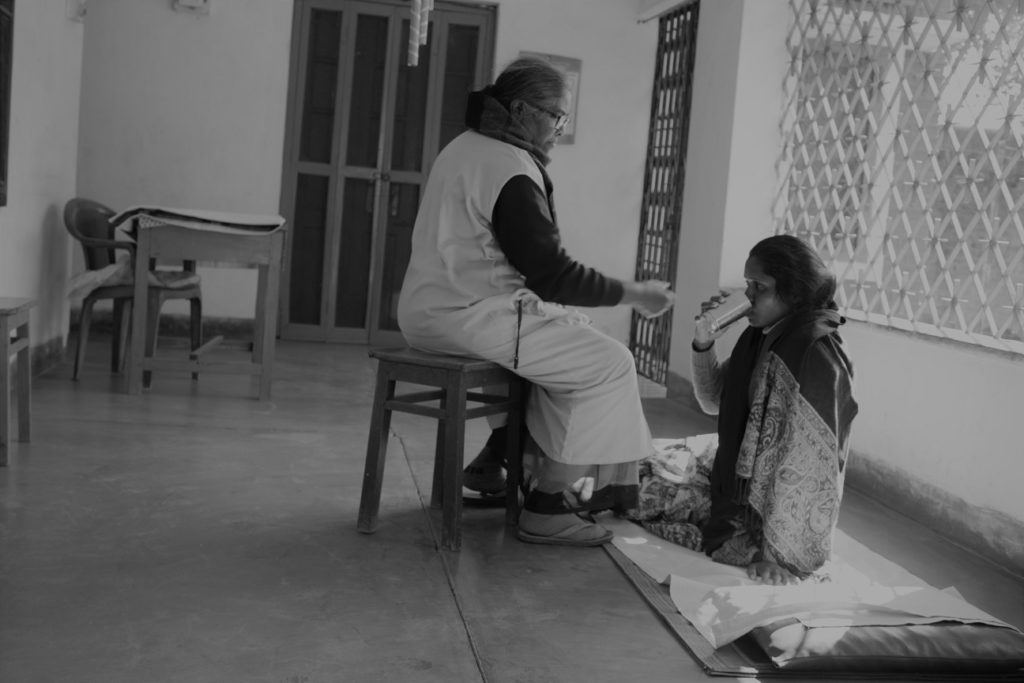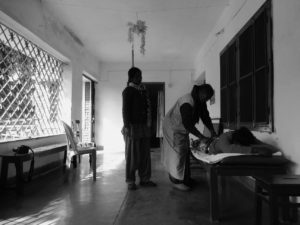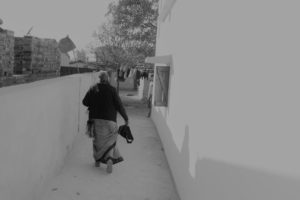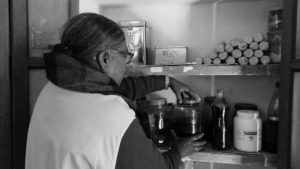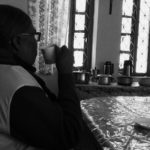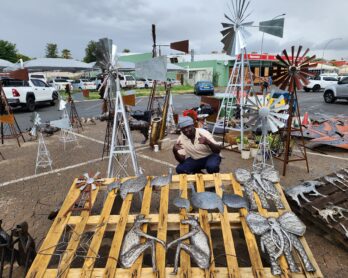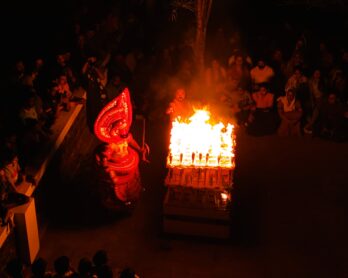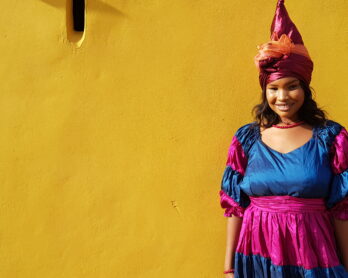A tribal woman, heavily pregnant, leaned against the iron gate sliding it open and walked into the health centre. Her gait was strained as she had broken water. Too weak to press the electric bell she just about managed to spread out a mat on the corner and collapse. She was alone; her husband was a rabble-rousing Captain Cooker with political ambitions who believed pregnant women were hoodoos to be avoided at all costs. The saving grace about him, I was told later, was that he wasn’t a soak and wife-beater. It was indeed a saving grace; the ‘bandhak’ culture among the alcoholics of rural Jharkhand is the lore of amoral gore. One recently told his creditor to keep his mother as bandhak. Captive. A collateral till he repaid.
Sister J was in her garden – a place she is understandably proud of and flaunted in front of everyone. A lot of hard work was put in by the arthritic nun here; in Kanker hinterlands where the soil is powdery and dry, the earth resembles a desert. But her various lilies and orchids and anthuriums are bursting colours like a Monet landscape. It is here she unwinds and remembers her childhood in a Simdega hamlet. Her parents and siblings, except one elder sister, were all dead. This sister is in their ancestral home, ill and dying. She has a son, a ‘badmash’ or rascal, who was trying to appropriate the house from the mother so he could sell it. Childhood memories wafted over the garden and never failed to make Sister J pine for her childhood and family.
“As children we had a garden at our house. There were blooms all round the year,” she reminisced with a faint smile and a distant look. “Our neighbours would say it was always Sarhul in our garden.” Sarhul is a spring festival of Jharkhand when there are flowers everywhere. But her work in the clinic made her postpone her plans for over a year now. Deep inside she knows that it will be a phone call that will take her back home. That is, if the badmash even bothers to inform.
The dispensary assistant walked in from the village where she had gone to buy wild lemons; she would proceed to dry the peels and pulverise them – an excellent source of Vitamin C – which the centre gave the children for free to protect them from common colds and other winter ailments. The assistant saw the tribal woman in a heap on the floor and called out for Sister J. She was sedulous in her ministrations; the woman was helped up and given glucose water to drink.
It is a small village of around 300 families, everybody knows everybody but pretends to be indifferent to each others’ plight. Presence, even. It is a matter of survival – helping out most of the time wiped out your own means of existence. The mother-to-be walked two kilometres to the centre and she was drained. Sister J took her pulse and patted her head. She is percipient in such matters. It is not about her ANM qualification (Auxiliary Nurse Midwife) but experience: over three decades of it.
“You are healthy,” the nun told the woman, “your contractions will not start in another 24 hours.”
The woman was relieved but only momentarily, she knew what was coming next. They had been there before – same settings and people, just a couple of years ago. She began shaking her head as if trying to pre-empt what the nun was going to say: that she had to go. Sister J looked out through the metallic grillwork at the cerulean sky. The winter sun beat down with crystallised intensity. Cotton clouds in the horizon shifted shapes and directions. A breeze brought leaves rustling around the sturdy ancient boles that stood sentry inside the convent. High pitched voices of children could be heard over the perimeter wall from the village school nearby; it was lunchtime and they were pumped up about the free afternoon meal, a central government dole on its way out. They would be cleaning again and wiping dry the steel plates they were expected to bring when they stood in line for rice, dal and sabzi, vegetable curry. It was the meal that brought most of them to school. The dispensation was still steadily axing its budgetary allocation.
“You should change into these,” Sister J said pointing to the fresh underskirt the assistant brought. “Not now, later. There will be some more water.” The tribal lady just kept shaking her head but with growing desperation.
“I will not go to a government hospital this time,” she said. “If I have to die, I will happily die here, in your arms.”
“You are not going to die,” Sister J frowned squeezing her finely formed arms. “Look at you, you are stronger than most men in the village.” This elicited a feeble laugh from the woman. The assistant beamed happily, placed the garment she was holding next to the woman and left with her bag of citrus fruits.
P and HC
‘Primary Health Centres (PHC) are the cornerstones of rural healthcare.’ Reads the first sentence on the India.gov.in site’s page. The rest – which talks about mandatory facilities and personnel – are at best ambitious. Their spread – manned and fitted as claimed – is only on paper. The one run by Sister J doesn’t qualify to be a PHC, not by a long shot – there are no medical officers or lab technicians or the half dozen others. The jeep is missing too. This is just a health centre or ‘centre’ as the villagers call it. But it is the first port of call in the event of a distress. What it lacks in amenities or recognition, it makes up with substantial experience and surfeit of good faith. And it is right in their midst.
“This centre had been around for at least 50 years,” Sister J told me. She herself had been there for nearly a decade now. “I know each and every family personally.”
“But with new government rules, centres like ours are deemed ill-equipped to be delivering babies.” In her own career spanning three decades as a midwife, Sister J has brought thousands of babies to this world; deliveries have taken place in riverbanks, cowsheds and public transport.
“I finally tell them about the fifteen hundred rupees the government gives for having your baby at the hospital.” Despite the incentive, not many budge.
“The government can give fifteen hundred or fifteen thousand rupees, I don’t care,” the tribal lady had said. “I want to have my baby here.” She said holding Sister J in a vice-like grip.
She was quite strong, this lady.
Saints and saviours: The reputation of Sister J when it comes to treating snakebites too is far and wide. She was taught by her grandfather and had been administering antivenoms for over half a century. Just last year itself she saved seven lives including one who was given up by a government hospital. Now, for the act of saving lives, to be feted through gallantry awards, cash prizes and sainthoods, should go viral. People like Sister J work in territories where the only network is no network.


